
Who can tell you what your customers want in the best manner possible?
The answer is – Your customers!
But how do you understand the needs, pain points, and requirements your customers have without undertaking time-consuming surveys, one-on-one interviews, and full-scale market research?
All you need are free web surveys – an excellent tool to gather customer feedback while enjoying economies of scale.
Let us find out how!
What Is a Web Survey?
Web surveys or web-based surveys are a method of collecting data and information from a number of people, called samples, to gather insights about the larger population (from which you have drawn the sample).
The surveys comprise questionnaires sent to or shared with the sample population via the internet, SMS surveys, social media, and website embed being the other ways to do so.
The respondents mark their answers via their web browsers, which are then stored in the web-based database.
When to Use a Web Survey?
Deciding when to use a web-based survey stems from different business, process, and operational needs. You might need to survey your customers when you are planning to launch a new product or when you are planning to make changes in any of your existing products.
When you involve your customers in key decision-making related to your products, they feel motivated, valued, and engaged. They contribute happily towards innovation upgrades and help you get that initial threshold sale by actively seeking out the products they gave feedback for.
Even if you are just getting started with your business idea, you must do a web survey to test the probable prospects or the current state of the market. You can get fantastic insights and ideas for marketing, customer targeting, pricing, etc.
There can be many other scenarios that call for web-based surveying, such as:
- Need for accurate observational data on survey respondents
- An existing product has been successfully validated by the target group and now you need to revamp it or upgrade it
- Capturing qualitative data or qualitative insights about customer satisfaction and happiness
- You need to capture and process quantitative data about your competitors, products, or customers
- You need to capture accurate timings, methodologies, or channels for marketing, promotion, support, communication, etc.
Depending on the business use cases, there can be numerous other scenarios that require web-based surveying.
Moving ahead, we discuss some important characteristics of a web survey.
Characteristics of a Web Survey
Every survey has a number of characteristics that make it feasible, relevant, and result-oriented. These characteristics also help you ensure the quality of your survey and guide you throughout the survey planning process.
These characteristics also serve as the criteria for web survey design as you can check and confirm whether your survey adheres to all of them or not.
However, web surveys tend to be highly subjective and vary from one business use case to another. Hence, we are sharing the most common survey characteristics for a web survey.
Also Read: Market Research Survey – 101 Guide
1. Survey Goals
Every web survey must have a well-defined objective because mindless research leads you nowhere. Before conducting a survey, it is important to decide the goal behind it – do you wish to know how well your products are performing, or do you wish to know which features of your product your customers absolutely love?
Despite being about your products, both these scenarios will have different web-based questionnaire surveys. You have to carefully choose the questions to align well with your survey objective.
Having clear objectives also allow you to focus on one particular pain point or issue at a time. You are able to collect highly refined data, and you can keep your business decision-making highly focused.
Related Read: 20+ Product Survey Questions
2. Right Research Methodology
Before you get started with the web surveys, you must finalize a proper research methodology for them. There are different types of research methodology, such as Primary research, Secondary research, Qualitative research, Quantitative research, etc.
These methodologies take different types of data sets as input and collect different types of data. When you process this data, you get different types of actionable insights.
For example, suppose you wish to know the percentage of customers looking for upgrades in your services. The most valid research methodology, in this case, would be quantitative research that aims at collecting numbers.
If you wish to dig deep into your customers’ problems, satisfaction levels, and brand perceptions or expectations, you must opt for qualitative research. This methodology aims at collecting qualitative insights instead of numbers.
Likewise, full-scale market research uses a primary research methodology that has a mix of both – qualitative and quantitative methodologies.
Hence, you have to keep the research objective in mind while deciding on the web survey methodology.
3. Questions (Types and Numbers)
Every web survey is different and has a unique goal. Hence, it is normal for it to have different types of questions.
Your surveys can have:
- Open-ended questions
- Multiple Choice Questions
- Rating scale-based questions
- Matrix questions
- Dropdown questions
- Demographic questions
Apart from considering the type of questions, you must include in your surveys; you have to pay attention to the number of questions you include in them. No customer would take a survey that looks like a class test and has 20 questions!
Keep your web surveys short, sweet, and direct for the best results.
Also Read: 90+ Market Survey Questions to Ask Your Customers
4. Well-Defined Target Audiences
Your surveys must have well-defined target audiences because a single survey would never be appealing or relevant to all the people. You can understand this like a person handing out flyers outside a restaurant. Not everybody passing by them might be interested in knowing about the latest offers or whatever the flyers are about.
Hence, define your target audiences and keep them in mind while conducting a survey.
For instance, if you are a chocolate brand looking for customer reviews for mint chocolate, you must survey the customers who have already bought mint chocolates from you or those that like mint chocolates. Somebody that is not a fan of mint chocolates is not a relevant respondent for this survey and is definitely not a part of your target audience.
5. Data Analysis
This is the most overlooked and crucial part of the entire web-based survey process. Once you have collected data, you need to process the same to understand the overall customer sentiment or gather actionable insights.
These actionable insights are the main results of a survey and help you formulate crucial business decisions or high-converting marketing strategies.
Now that we have an overall understanding of the web surveys, we discuss the types of surveys in the next section.
Related Read: How to Analyze Survey Data
Types of Web Surveys
The web-based surveys can be of many types depending on the channel of distribution and the survey methodology used.
We have hinted at some types of survey methodologies in the previous section. Next, we share the types of surveys based on the channel of distribution.
1. Email Surveys
Email surveys are one of the most common web survey types that are shared via emails. Emails are cheap, highly scalable, highly efficient, and can be planned well ahead of time as a sequence of emails that automate the entire process of web-based surveying.
What makes them an excellent medium of survey distribution is the fact that you can create different series of surveys via multiple emails that get triggered when:
- A customer reaches a specific milestone in his journey with your brand
- A customer completes one part of a highly-detailed survey
- A prospect has shown an interest in your offerings, and the lead is being nurtured via a step-by-step guided experience
For example, take a look at this wonderful email survey invite that also promises a discount to the survey takers:
Further, you can share email surveys to thousands of people in one go and even as cold surveys to untapped customer segments.
2. SMS Survey
SMS surveys are shared via SMS and are perfect for surveying a very large set of people located in one geographical location. SMS surveys are also used when you need to collect geo-location-based survey data, as you can easily classify your respondents using phone numbers.
Below, we have an example of SMS-only survey question:
SMS surveys can also contain a website URL that people can click to reach the surveys and record their responses. SMS surveys work well for NPS question surveys.
An example of such SMS surveys is shown below:
3. Social Media Surveys
Social media is getting increasingly popular as of late, with market giants like Facebook having more than 2.89 billion monthly active users. With such a huge following across the globe, social media is becoming a personal favorite of brands looking for popular survey platforms.
A good example of social media surveys is shown below:
Facebook, Instagram, WhatsApp, and LinkedIn are some of the most popular choices as they allow you to reach a wide range of customers with highly diverse preferences and brand expectations.
Also Read: Best Ways to Utilize Social Media for Surveys
4. QR Code Surveys
You can create QR codes, then convert your web surveys into QR codes and publish them either in print or via online media. The customers can use their smartphones with QR scanners to scan the QR code, reach the web survey, and record their answers.
These surveys are generally used by companies looking for a customer experience stemming from long-term use of a product, such as motors or hardware tools. The QR code for the surveys is printed on the product and can be scanned by the user later for recording their responses.
Take a look at the following image for a better understanding:
5. Web Intercept Surveys
These surveys can yet be of multiple types, such as on-page surveys, popup surveys, time-based surveys, and exit surveys. This is a non-intrusive way of surveying your customers and website visitors as they don’t have to visit any new web page or click on a URL or scan a QR code.
They can simply take the short surveys right at the same window they are browsing and record their responses.
See how effortless and minimally intrusive these surveys are:
This is one of the prime reasons for the popularity of these surveys.
Up next, we discuss some benefits of web-based surveys to help you understand the importance of surveying your customers.
FREE. All Features. FOREVER!
Try our Forever FREE account with all premium features!
Advantages of Web-Based Surveys
Surveying your customers comes with obvious benefits, such as a better understanding of their expectations and requirements. You can identify the current levels of customer satisfaction and take steps to enhance customer happiness by streamlining your brand offerings.
Take a quick look at the various advantages to understand how powerful and beneficial a simple and free web survey can be for your business.
1. Better Accessibility and Reachability
Paper-based surveys are clunky, resource-intensive, and no longer relevant as the customers don’t have time to mark their responses. Their reach is limited, and the chances of them not reaching the target audiences are extremely high. Further, the processing of data collected in these surveys is troublesome and vulnerable to human errors.
On the other hand, online surveys are highly resource-efficient and scalable and allow you to address a large number of customers in a highly targeted manner. Data collected from them gets stored in web servers and can be analyzed easily via web-based survey tools that come with analytics and reporting.
2. Authentic Information
As you can target your web surveys to a specific pool of customers or people that might become your customers, you get the most authentic information. This information helps in formulating highly data-driven business strategies and drives confident decision-making.
As you are getting data from well-defined customer segments, the error margins are considerably lowered.
3. Resource Efficiency
Paper-based surveys are highly time and effort-consuming. You have to invest a large sum of money to get them printed, distributed, and processed. The online surveys are a one-time investment, as all you have to do is invest in a smart and intuitive web-based survey tool, such as ProProfs Survey Maker, and you can create as many surveys as you want.
It makes web survey creation an extremely easy process. You can create them in minutes, using the pre-built survey templates and questions in the survey maker, and share them across multiple channels with a single click.
4. No Guesswork
Processing survey data offers you rich and actionable insights into the actual market demand, competitor strategies, and customer requirements.
You can leverage these insights to create highly targeted marketing strategies that spur results and steer your business towards sustainable growth. You can take every decision, especially the investment-intensive ones, based on the survey results and minimize your business risks.
However, just like every other great thing, surveying also has some disadvantages stemming from erroneous approaches and improper understanding of surveys.
We discuss some disadvantages of surveys in the next section.
Disadvantages of Web Surveys
Can surveys have disadvantages? Yes, but they are highly subjective and are not generated because of the surveying itself.
Take a quick look at these disadvantages for a better understanding.
1. Over-surveying
While it is good to survey your customers, over-surveying leads to nothing but survey fatigue. Further, you must take some time to implement the survey results and check their performance before you move on to conducting another survey.
We know that the ease of web survey creation can lead to impulse surveying, but the results are never worthwhile, just like impulse buying.
2. High Fluctuations in the Market
The modern business landscape is extremely competitive, agile, and volatile. Brands appear and disappear like fog, and trends can fade as swiftly as they come.
While this leads to major disruptions in industries, such as IT, SaaS, Tech, and eCommerce, some industries are quite resistant to these changes. Examples of such industries are education, tool manufacturing, parts manufacturing, etc.
As survey results take time to be implemented and spurring results, the rapid market fluctuations might reduce their impact.
3. Changing Customer Expectations
Just like the market, customer expectations change from time to time. They might want to avail support via social media one day and then wish to speak to a customer support executive on the other.
It is also possible that they demand a new product feature, which they might end up hating later on. Another concern that stems from the customer side is the inappropriate or unfair response recording. You cannot do anything if a customer simply marks random answers.
So, while surveying is good, in-depth market research with predictive analytics and other advanced technologies can lead to better and more robust results.
4. Results Are Based on Questions
As survey respondents record their responses as per the questions you choose, the results tend to be as good as the questions you choose. Hence, surveys are not going to generate good results if you choose improper questions or sequence them improperly.
As you can see, these disadvantages stem from an improper approach towards web-based surveying, and you can avoid them by following the best practices.
Web Surveys: A Powerful and Efficient Tool for Businesses
Web surveys are undoubtedly powerful, offering the ease of gathering customer insights and market data in a highly affordable and efficient manner. They empower brands with critical and actionable insights and facilitate confident decision-making stemming from reliable data.
However, choosing the right web-based survey tool is a critical must-have, as the quality of your survey questions, design of surveys, and analysis of survey data will depend on its capabilities.
So, choose the right survey maker tool and transform your business with delightfully smart and scalable surveys.
FREE. All Features. FOREVER!
Try our Forever FREE account with all premium features!

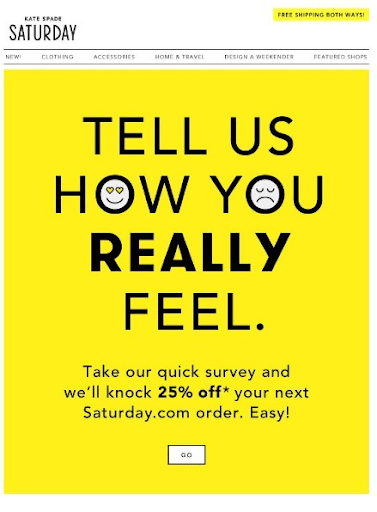
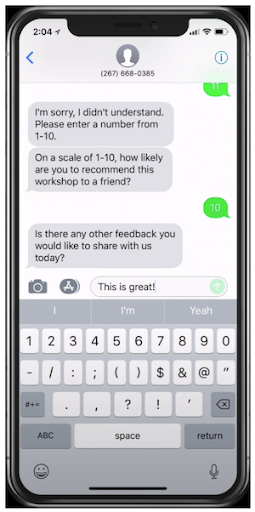
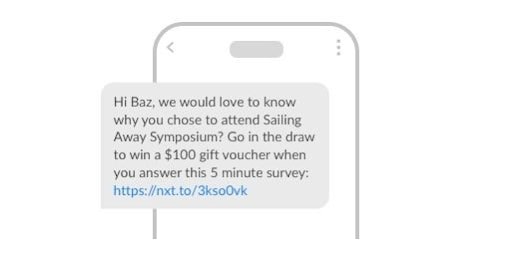
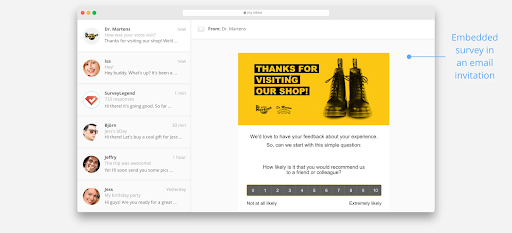

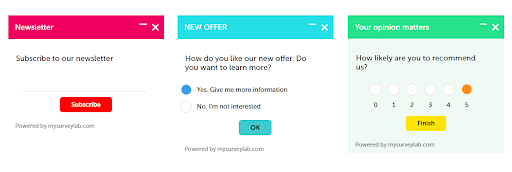
 We'd love your feedback!
We'd love your feedback!
 Thanks for your feedback!
Thanks for your feedback!







